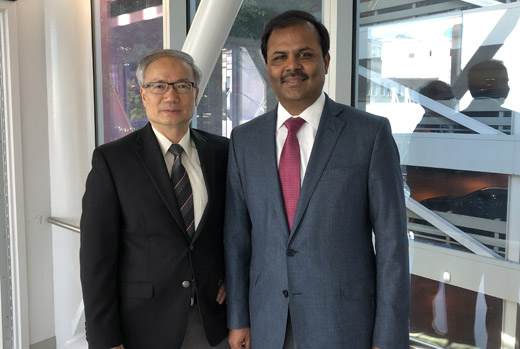Winship Cancer Institute of Emory University has been awarded a five-year, $9.7 million Specialized Program of Research Excellence (SPORE) grant from the National Cancer Institute (NCI) to study new approaches for lung cancer treatment. It's the first and only grant of its kind to be awarded in the state of Georgia and one of only four SPORE grants in the U.S. dedicated to lung cancer.
Led by Suresh S. Ramalingam, MD and Haian Fu, PhD, this unique translational cancer research program will support an elite team of Winship investigators in the fields of immunology, pharmacology, medical oncology, radiation oncology, surgical oncology, and pathology to address major therapeutic challenges faced by patients with lung cancer.
"This Lung Cancer SPORE grant will allow us to develop truly novel approaches for lung cancer patients and to improve their outcomes," says Walter J. Curran, Jr., MD, Winship's executive director and one of the investigators on this project.
"We will investigate how to improve immunotherapy for patients, how to test novel targeted therapies to overcome resistance, and how to accelerate new treatment paradigms," says Ramalingam, Winship's deputy director and contact principal investigator for the new grant. "By conducting cutting-edge clinical trials that build on a very strong biological basis, we will improve outcomes for patients with lung cancer."
"Guided by urgent clinical needs, the multi-disciplinary team of physician and basic scientists will work together to not only address current challenges, but also to develop the next generation of innovative therapeutic strategies for cancer patients," adds Fu, a multi-principal investigator of the grant and chair of the Department of Pharmacology and Chemical Biology. He also leads Winship's Discovery and Developmental Therapeutics Program along with Ramalingam.
Lung cancer is the leading cause of cancer-related deaths in the world. An estimated 228,000 new cancers will be diagnosed in the U.S. this year, with more than 7,000 in Georgia alone.
Ramalingam explains that there are challenges with immunotherapy and targeted therapies currently being used to treat lung cancer patients. He says, "Immunotherapy only works for a subset of patients. Our goal is to understand why some patients do well and what we can do to benefit a greater group of patient."
While targeted therapies are effective in treating lung cancer, over time, most patients develop resistance to the drugs. Ramalingam and his colleagues will investigate how to overcome the resistance so that patients can continue to be on extended therapies and carry on with their lives.
In addition to Ramalingam, Fu, and Curran, other key contributors to the NCI SPORE grant (P50CA217691) from the National Institutes of Health include the following Winship investigators: Drs. Rafi Ahmed, Madhusmita Behera, Zhengjia Chen, Xingming Deng, Felix Fernandez, Douglas Graham, Anthea Hammond, Michael Kutner, Adam Marcus, Taofeek Owonikoko, Rebecca Pentz, and Gabriel Sica.

